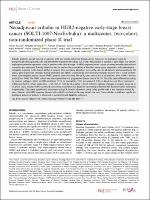| dc.contributor | Vall d'Hebron Barcelona Hospital Campus |
| dc.contributor.author | Pascual, Tomás |
| dc.contributor.author | Antunes de Melo Oliveira, Ana Mafalda |
| dc.contributor.author | Villagrasa, Patricia |
| dc.contributor.author | Ortega Cebrian, Vanesa |
| dc.contributor.author | Nuciforo, Paolo Giovanni |
| dc.contributor.author | Rubio Rodríguez, Isabel Teresa |
| dc.contributor.author | Cortés Castan, Javier |
| dc.contributor.author | Paré, Laia |
| dc.contributor.author | Bermejo, Begoña |
| dc.date.accessioned | 2022-05-24T06:31:19Z |
| dc.date.available | 2022-05-24T06:31:19Z |
| dc.date.issued | 2021-11-25 |
| dc.identifier.citation | Pascual T, Oliveira M, Villagrasa P, Ortega V, Paré L, Bermejo B, et al. Neoadjuvant eribulin in HER2-negative early-stage breast cancer (SOLTI-1007-NeoEribulin): a multicenter, two-cohort, non-randomized phase II trial. NPJ Breast Cancer. 2021 Nov 25;7:145. |
| dc.identifier.issn | 2374-4677 |
| dc.identifier.uri | https://hdl.handle.net/11351/7569 |
| dc.description | Càncer de mama; Marcadors predictius; Recerca translacional |
| dc.language.iso | eng |
| dc.publisher | Nature Research |
| dc.relation.ispartofseries | NPJ Breast Cancer;7 |
| dc.rights | Attribution 4.0 International |
| dc.rights.uri | http://creativecommons.org/licenses/by/4.0/ |
| dc.source | Scientia |
| dc.subject | Mama - Càncer - Tractament |
| dc.subject | Avaluació de resultats (Assistència sanitària) |
| dc.subject.mesh | Breast Neoplasms |
| dc.subject.mesh | /drug therapy |
| dc.subject.mesh | Neoadjuvant Therapy |
| dc.subject.mesh | Treatment Outcome |
| dc.title | Neoadjuvant eribulin in HER2-negative early-stage breast cancer (SOLTI-1007-NeoEribulin): a multicenter, two-cohort, non-randomized phase II trial |
| dc.type | info:eu-repo/semantics/article |
| dc.identifier.doi | 10.1038/s41523-021-00351-4 |
| dc.subject.decs | neoplasias de la mama |
| dc.subject.decs | /farmacoterapia |
| dc.subject.decs | tratamiento neoadyuvante |
| dc.subject.decs | resultado del tratamiento |
| dc.relation.publishversion | https://doi.org/10.1038/s41523-021-00351-4 |
| dc.type.version | info:eu-repo/semantics/publishedVersion |
| dc.audience | Professionals |
| dc.contributor.organismes | Institut Català de la Salut |
| dc.contributor.authoraffiliation | [Pascual T, Villagrasa P, Paré L] SOLTI Breast Cancer Research Group, Barcelona, Spain. [Oliveira M] SOLTI Breast Cancer Research Group, Barcelona, Spain. Servei d’Oncologia Mèdica, Vall d’Hebron Hospital Universitari, Barcelona, Spain. Vall d’Hebron Institute of Oncology (VHIO), Barcelona, Spain. Breast Cancer Program, Vall d’Hebron Institute of Oncology (VHIO), Barcelona, Spain. Vall d’Hebron Hospital Universitari, Barcelona, Spain. [Ortega V] Servei d’Oncologia Mèdica, Vall d’Hebron Hospital Universitari, Barcelona, Spain. Vall d’Hebron Institute of Oncology (VHIO), Barcelona, Spain. Breast Cancer Program, Vall d’Hebron Institute of Oncology (VHIO), Barcelona, Spain. Vall d’Hebron Hospital Universitari, Barcelona, Spain. [Bermejo B] Department of Medical Oncology, Hospital Clínico Universitario de Valencia, Valencia, Spain. [Nuciforo P] Molecular Oncology Lab, Vall d’Hebron Institute of Oncology (VHIO), Barcelona, Spain. [Rubio IT] Breast Cancer Program, Vall d’Hebron Institute of Oncology (VHIO), Barcelona, Spain. Vall d’Hebron Hospital Universitari, Barcelona, Spain. [Cortés J] Servei d’Oncologia Mèdica, Vall d’Hebron Hospital Universitari, Barcelona, Spain. Vall d’Hebron Institute of Oncology (VHIO), Barcelona, Spain. International Breast Cancer Center (IBCC), Quiron Group, Barcelona, Spain. Medica Scientia Innovation Research (MEDSIR), Barcelona, Spain |
| dc.identifier.pmid | 34824288 |
| dc.identifier.wos | 000722599200001 |
| dc.rights.accessrights | info:eu-repo/semantics/openAccess |

 Àrea privada
Àrea privada Contacte
Contacte









